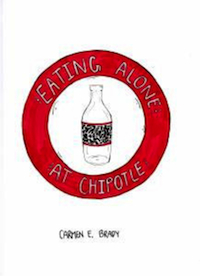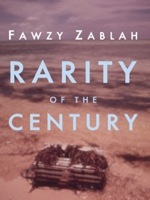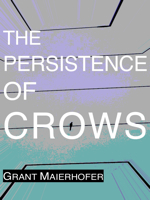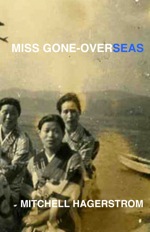 In the poetry of Carmen E. Brady, dust has settled upon the persona of Eating Alone at Chipotle. Available from CA Mullins’ Bottlecap Press, Brady’s chapbook is the very definition of ‘pensiveness.’ Quiet moments abound throughout this chapbook, moments which are informed by the persona’s sad thoughts and reflective realizations. Eating Alone at Chipotle is filled with the desire for reality to be just a little bit closer to perfection; but, in the absence of perfection, Brady’s persona finds a way to reach a Zen-like stance with regard to reality and the life led. Brady’s character neither accepts nor rejects the positive or negative implications of their life’s situations and actions or the realizations reached while pensively alone. Solitude, naturally (given the chapbook’s title), is a continual theme in Carmen E. Brady’s chapbook; while taken from one of the poem’s titles, however, the chapbook’s title is actually indicative of the mood of the entire chapbook. The majority of these poems quietly examine the suddenly rising thoughts, memories, and desires which often come while alone in a silent world, just before we fall asleep or while eating alone in a studio apartment. Furthermore, many of the poems seamlessly stitch humor and pathos together in a way mildly reminiscent of Megan Boyle’s debut poetry book, which was in turn often presented in the perspective of depressive realism, which is the ability to view reality more accurately due to depressive tendencies; indeed, Brady’s persona certainly possesses a depressive realism streak of insight. Carmen E. Brady’s poetry documents the ever-so-slightly connected mental thoughts and realizations of a mind which has been allowed to wander, to daydream, to dream of perfection.
In the poetry of Carmen E. Brady, dust has settled upon the persona of Eating Alone at Chipotle. Available from CA Mullins’ Bottlecap Press, Brady’s chapbook is the very definition of ‘pensiveness.’ Quiet moments abound throughout this chapbook, moments which are informed by the persona’s sad thoughts and reflective realizations. Eating Alone at Chipotle is filled with the desire for reality to be just a little bit closer to perfection; but, in the absence of perfection, Brady’s persona finds a way to reach a Zen-like stance with regard to reality and the life led. Brady’s character neither accepts nor rejects the positive or negative implications of their life’s situations and actions or the realizations reached while pensively alone. Solitude, naturally (given the chapbook’s title), is a continual theme in Carmen E. Brady’s chapbook; while taken from one of the poem’s titles, however, the chapbook’s title is actually indicative of the mood of the entire chapbook. The majority of these poems quietly examine the suddenly rising thoughts, memories, and desires which often come while alone in a silent world, just before we fall asleep or while eating alone in a studio apartment. Furthermore, many of the poems seamlessly stitch humor and pathos together in a way mildly reminiscent of Megan Boyle’s debut poetry book, which was in turn often presented in the perspective of depressive realism, which is the ability to view reality more accurately due to depressive tendencies; indeed, Brady’s persona certainly possesses a depressive realism streak of insight. Carmen E. Brady’s poetry documents the ever-so-slightly connected mental thoughts and realizations of a mind which has been allowed to wander, to daydream, to dream of perfection.
The persona’s search for perfection begins with the two opening poems, in each of which there is the establishment of, for the persona, a sought-after individual, a lover who remains within the persona’s mind throughout the chapbook. The kaleidoscopic “Desert Air” is a love poem built upon a foundation of sand. While there are allusions to prayers of lasting love, the prayers themselves being perversions of religious convention and made with the intention of maintaining a less-than-perfect relationship, the sex-themed prayers are half-hearted and unconvincing. Continuing the theme of relationship intimacy connected with the outdoors, “Parting” carries the hope of the aforementioned prayers from “Desert Air;” but this hopefulness, this need on the persona’s part for everything to succeed, foreshadows the inevitable, which crashes in abruptly as “Spring Is Overrated.” This poem’s tone is fittingly informed by anger, frustration, and bitter coldness since this poem is the fallout of the chapbook’s two openers. Lacking love once had, the persona does not wish to experience the changing of seasons, which signify rebirth and the renewal of life; indeed, the persona, having lost love, wishes to stay in a wintry realm, a frozen space where they can convey their unhappiness and displeasure with the changing world. Sadly, the persona claims to have sworn off sex in an attempt to maintain said wintry cold life, but made an exception for the aforementioned love-interest, who ended up already having “a girlfriend by the time I got back.” After the initial fallout, the aftermath of the persona’s solitude and unhappiness continues in “Then I Realized They Might Be Doing the Same Thing,” in which the persona attempts to find some sort of goodness in those who shop at health food stores. But the persona, who is a possessor of a perspective informed by depressive realism, realizes that, as the title says, these other people might be trying to find happiness in their lives too. “I Do Everything Because I Can” again exists within the unhappy realm of quietly desiring to possess the perceived happiness that others seem to have. In this sad solitude, there is the night, which will always be there to comfort and hold the persona, to provide a stability never given by the trouble-causing love-interest. The poem “NPR” demonstrates the persona’s desire for everything to be just a little bit closer to perfection. Starting outward from the sky and the street, the persona’s desire slowly moves inward toward neighbors and the sad self. The neighbors can be heard listening to NPR, which increases within the persona a desire for companionship, since all parties are “white and middle class and educated, but sensitive and informed, dammit.” But as noon approaches, true reality is set in stone because the persona must acknowledge that the neighbors will not be friends, the mornings will lack pink clouds, children will be too close, and, when the persona listens to music or the radio, they do so with headphones “so no one shares what I hear.”
The titular poem, “Eating Alone at Chipotle,” slowly rumbles toward eruption because Brady’s poem crashes into the reader with the power of tectonics. What begins as a situation just as Megan Boylesquely humorous and sad as the title suggests, quickly becomes through the power of alcohol and Mexican fast food an occasion for not-so-fond reminiscences of the love-interest. While loneliness is at first desired and achieved, the effects of time, beer, and extra salsa work upon the persona to elicit pathos, which in turn prompts a desire for companionship and, eventually, a renewed relationship with the past love-interest. But in this moment (and perhaps helped by booze and spicy food), the persona does not give in to pure emotion, instead opting to critically analyze their feelings. Does the persona truly miss the love-interest? or do they instead miss the familiarity of the love-interest? Is there a difference? Does it matter? The persona is unsure, but a realization emerges: the former love-interest is now a dormant volcano “that never fully erupted.” While “Girls Who Look Like NYC” conveys additional desires and longings, “Today Is Important” is a poem of communal celebration from a comfortable distance. While many of the poems in Eating Alone at Chipotle examine external reality before working in toward the sad self, “Today Is Important” functions in reverse. Beginning with masturbatory thoughts of the former love-interest, the persona is afterward quietly surprised and delighted by the merriment of strangers parading in the street to celebrate life. The poem’s thematic reversal is also demonstrated structurally by the opening stanzas being quite long and prose-like, signifying the cold reality of unhappy thoughts before morphing into small single-line, short-sentence stanzas, which highlight the transformative and transfixing reality of happiness, joy, and love of life that the persona experiences while watching the triumphant parade. After the celebratory boost, the poem “Brunch” expresses a strong sense of desire to show the beauty of the world as the persona sees and understands it. The follow-up to the poem “Eating Alone at Chipotle” is “Puking Alone in Front of Chipotle,” which is hilarious and sad and, therefore, probably the best Megan Boylesque poem in Carmen E. Brady’s chapbook. A step-by-step documentation of a person “having ‘a day’,” this poem contains: a chagrin-inducing puking event, an attempt at befriending a stranger, pondering sending a sext-esque text, and providing chairs to a party that the persona is unsure about whether or not to attend. The poem’s finale is quite Megan Boylesque in that a neighbor asks to borrow chairs for a party that, incidentally, the persona is then invited to attend, although doubt is cast upon the sincerity and good-naturedness behind the invitation. Nevertheless, the Zen-like stance of agreeing to provide the chairs while simultaneously leaning toward not actually attending the party is quintessential Brady, and this Zen-like attitude comes to fuller fruition as the chapbook reaches climax.
“Navel Gazing in the Time of Ebola” is another poem of a quiet moment spent alone reflecting on current events, the self in the present, and the goodness of that self with regard to their impact in the world, via the declaration that, in not having children, the amount of unhappiness and suffering in the world and in the lives of those unborn children, render the persona “a benevolent woman.” In the poignant “The Cyclist was OK,” the persona encounters several people who are having bad days, which increases the persona’s empathy for and solidarity with them. The nearness of tiny disasters makes for a blossoming environment of gratitude within the persona, but when they are the cause of one such disaster (the titular cyclist), deep anxiety enters the persona’s mind. The similarly written “Bottomless Salad and Breadsticks” is filled with various incidents of broken bones, cracked skulls, and childhood seizures. Like a drying empty water fountain or continuing to eat while someone else is injured, the persona acknowledges that it is easier to feel nothing and/or do nothing out of fear of owning the responsibility of the accident or injury, which, in the realm of greater implications, can function as one way in which to handle a floundering relationship. The poem “Evan Williams,” named after a brand of whiskey, is a reflection on attraction, on being upset at being ignored, and being upset for conversely purposefully ignoring someone else. Brady’s persona, by poem’s end, seems to have once again reached a Zen-like understanding of being described as having “no personality” but being invited by the accusing party to hang out and drink any way. A pensive realization, Brady’s persona seems calm and level-headed and, again, Zen-like about this two-faced behavior. “Actual Time” is another poem of another quiet moment in a quiet room with quiet thoughts and quiet desires, but the desires are neither actually realized nor fully articulated. Wanting something akin to ‘comfort’, the persona feels a void described as “unproductively sad” and therefore spends the day alone, eating plain yogurt in a bed filled with laundry and crumbs. Wanting the surrounding reality to be greater than it is, the persona realizes that the world is also in a state of wanting something neither actually realized nor fully articulated; after all, “the night sky is gray with light pollution” and the closest the persona can come to articulating that quiet desire is wanting people to speak as though “there are still stars.”
While the persona of Eating Alone at Chipotle further acquires a Zen-like stance in the final two poems, the facts of the poems are heartbreaking and, therefore, ideal as a chapbook coda. The deeply emotional and impactful “2E” fearlessly dives into dark territory in search of sunken treasure: in search of meaning; the love-interest was a royal jerk and could be easily described as mentally and emotionally abusive. The persona’s term “easy confusion” conveys mixed emotions and misunderstandings between both parties, which all too often occur when issues of the heart are mingled and mangled. A devastating and violent poem, “2E” is also one of necessity, just as the chapbook closer, “Morning Soliloquy,” is also a poem of necessity. In answer to both the proceeding poem and the entire chapbook, “Morning Soliloquy” sees the fulfillment of the persona’s Zen-like attitude, although, given the facts of “2E,” that Zen is decidedly within the realm of nihilism. Given the repetition of “nothing,” “Morning Soliloquy” leaves the persona transformed into one who has re-embodied the attitude first seen in “Spring Is Overrated,” but from a perspective devoid of passions apart from negative neutrality. As such, Carmen E. Brady’s Eating Alone at Chipotle passes through a range of neutrally “Zen’d” emotions. Pensive and quiet, Brady’s persona desires a love-interest who is certainly not worthy, but who is desired all the same. Reflective solitude and melancholic humor abound in this Bottlecap Press chapbook while its persona sees reality through a depressive realism perspective. It seems like too much to juggle, but Carmen E. Brady deftly handles these numerous topics, moods, and attitudes with these beautiful, impressive poems.
 AUTHOR BIO:: dom schwab is a reader/writer of poetry/prose. dom is gay, GQ w/ no pronoun preference, a vegetarian, and lives in Chicago. dom’s most recent work has appeared in Zoomoozophone Review’s female/non-gender-conforming Issue 5, Boscombe Revolution Issue 3: Revolution & Gender, and JunkYard Kool, an anthology presented by Kool Kids Press.
AUTHOR BIO:: dom schwab is a reader/writer of poetry/prose. dom is gay, GQ w/ no pronoun preference, a vegetarian, and lives in Chicago. dom’s most recent work has appeared in Zoomoozophone Review’s female/non-gender-conforming Issue 5, Boscombe Revolution Issue 3: Revolution & Gender, and JunkYard Kool, an anthology presented by Kool Kids Press.








